Do you encounter File History not working on your Windows 11? Why that could happen and how to troubleshoot it? This article on MiniTool Solution will guide you in fixing the issue of Windows 11 File History not working.
File History is a convenient utility that regularly backs up copies of your files in documents, music, pictures, videos, and desktop folders, and the OneDrive files available offline on your device.
Common Scenarios of File History Not Working on Windows 11
Compared to Windows 10, File History in Windows 11 can only back up preset folders. Its normal operation depends on a series of components and settings. In the following scenarios, you may face File History not working.
- File History fails to back up the specified files and folders on Windows 11.
- Windows 11 File History drive is disconnected. Here you’ll receive a message that says “Reconnect your drive. Your File History drive is disconnected”. It means there is trouble with the connection to the target drive, or there could be some potential issues with the target drive itself.
- File History does not recognize external storage devices. It will inform you with an error message like “File History doesn’t recognize this drive”.
- The message “File History has found files that are encrypted with Encrypting File System” also means File History not working. It indicates that File History will stop working when facing files encrypted with Encrypting File System.
According to these potential cases, we can explore and put forward appropriate solutions.
Quick Fix: Windows 11 File History Not Working
Now, let’s see how to troubleshoot File History not working on Windows 11.
Fix 1. Adjust File History Settings and Configuration
Before starting the adjustment process, you can check if there are any unusually long file names or excessively complex directory structures among the unbacked-up files. If so, try simplifying the file names or reorganizing the folders to reduce complexity and resolve the issue.
If Windows 11 File History still doesn’t work, then you should try to adjust its settings and configuration.
Control Panel > File History
Step 1: Type Control Panel in Windows search and open it.
Step 2: Go to find and select System and Security > File History, click on Turn off, and later click on Turn on on the right side. This step may solve some glitches or conflicts.
Step 3: Ensure that you have selected the correct backup drive or network location.
File History Service
Step 1: Press the Win + R keys to open the Run window.
Step 2: In the new pop-up, type services.msc and hit Enter to launch the Services window.
Step 3: Scroll down to locate File History Service, right-click it to open a shortcut menu, and choose Properties.
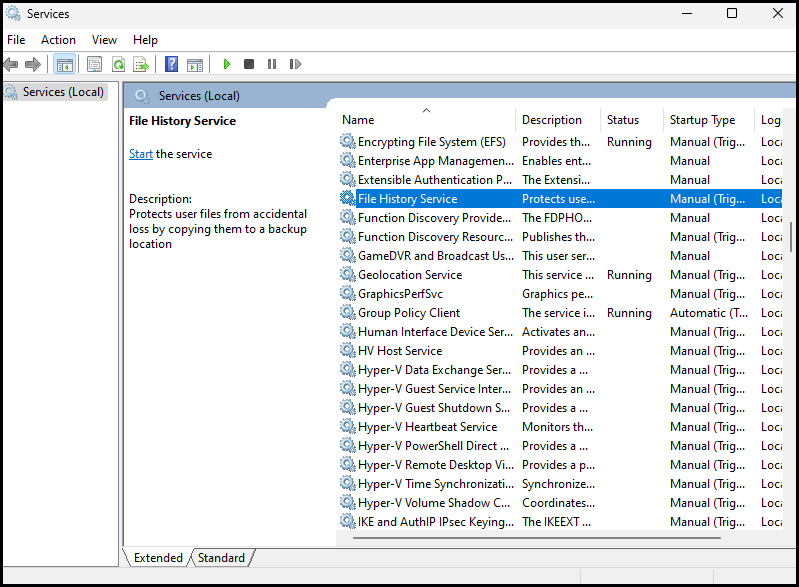
Step 4: In the General tab, open the Startup type dropdown menu and select Automatic. Then click on Apply and OK in turn. This change can make File History Service start up with the system.
Fix 2. Restart File History Service
Step 1: Open the Services app using the same steps as the previous method.
Step 2: Navigate to File History Service, right-click it, and choose Restart from the dropdown menu. Then close the window and check if File History works properly.
If that does not resolve the problem, try the next solution.
Fix 3. Reset File History
Step 1: Open Command Prompt as an administrator.
Step 2: In the Command Prompt window, type the command line below and hit Enter to run it.
if exist “%UserProfile%\AppData\Local\Microsoft\Windows\FileHistory” RD /S /Q “%UserProfile%\AppData\Local\Microsoft\Windows\FileHistory”
Fix 4. Decrypt the Encrypted Files or Folders
Step 1: Find and right-click on your encrypted file or folder, then select Properties > General > Advanced.
Step 2: Uncheck Encrypt contents to secure data and click OK to confirm.
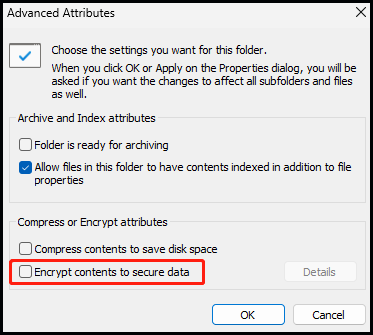
Fix 5. Update Windows and Device Drivers
Step 1: Open Settings > Windows Update. Under this section, you will see available updates if any.
Step 2: If there is one or more, click on Download and install. Once done, restart your computer for the new patches and improvements to take effect.
Step 3: As to updating your device driver, you can download the latest version of the device driver that is compatible with Windows 11 on the official website.
Alternative Backup Tool
The built-in File History on your computer is very convenient, but it has limitations in terms of backup functionality and is prone to errors. This way, using an alternative backup tool like MiniTool ShadowMaker can enjoy even more wonderful benefits.
MiniTool ShadowMaker is a professional Windows backup software that is compatible with the Windows 11/10/8/7 operating system. It allows you to create files, folders, disks, partitions, and system backups, to various targets such as shared folders, USB flash drives, external hard drives, and network locations. At the same time, feel free to customize a variety of advanced settings, like setting an automatic backup or changing backup mode.
With MiniTool ShadowMaker, you can relax now and there’s no need to worry about backups anymore even Windows 11 File History stopped working. Now, we will show you how to create a file backup using it.
Step 1: Download and install MiniTool ShadowMaker Trial. Then launch it and click on Keep Trial.
MiniTool ShadowMaker TrialClick to Download100%Clean & Safe
Step 2: Under the Backup section, click on SOURCE > Folders and Files to select the desired files or folders. Then click OK to turn to DESTINATION, choose the target path where you have the backup image saved, and click OK to continue.
Step 3: Click on Back Up Now to start the backup task. You can go to Manage to check the backup process.
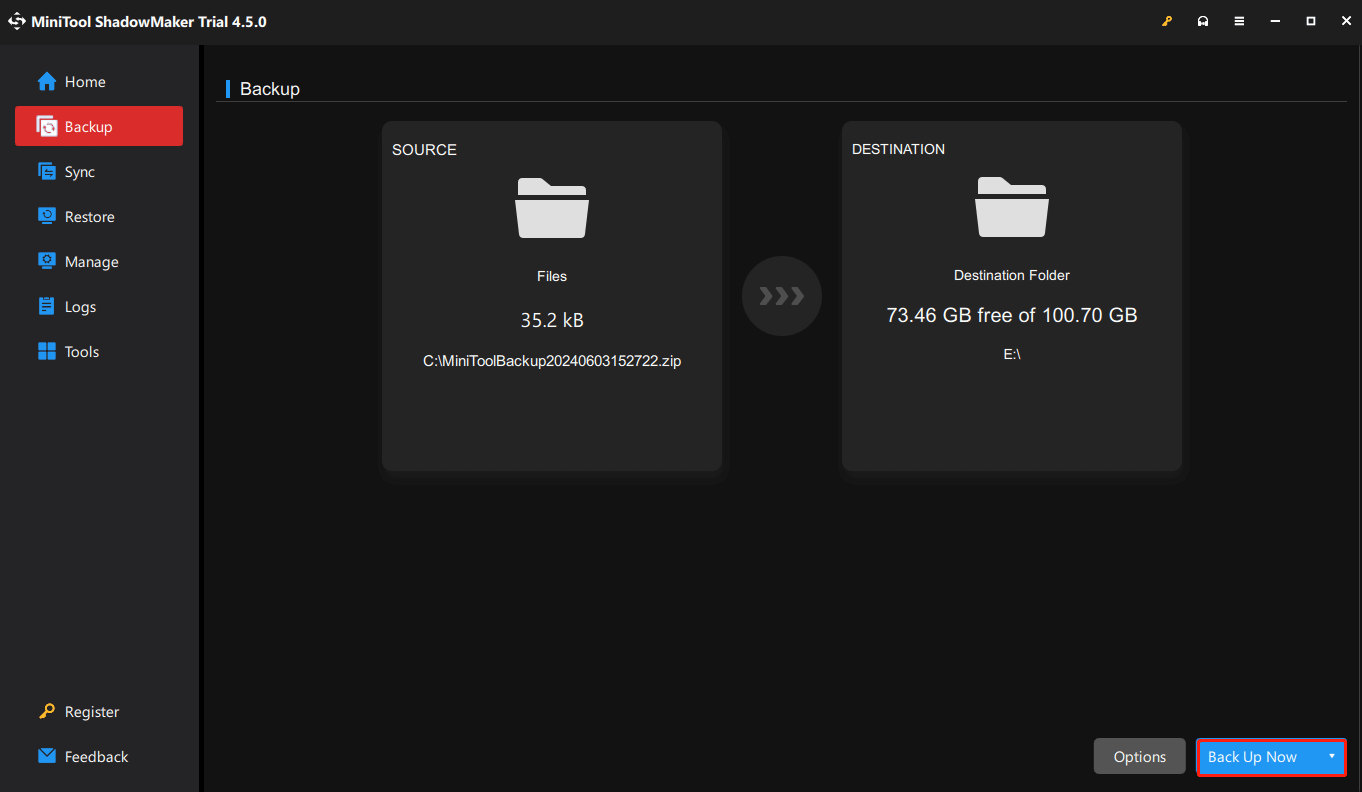
Bottom Line
To resolve Windows 11 File History not working, pick one suitable solution above based on your situation. Additionally, we also recommend you use MiniTool ShadowMaker in place of File History. To make progress, we need your support and suggestions so please feel free to contact us via [email protected]. We will reply to you as soon as possible.
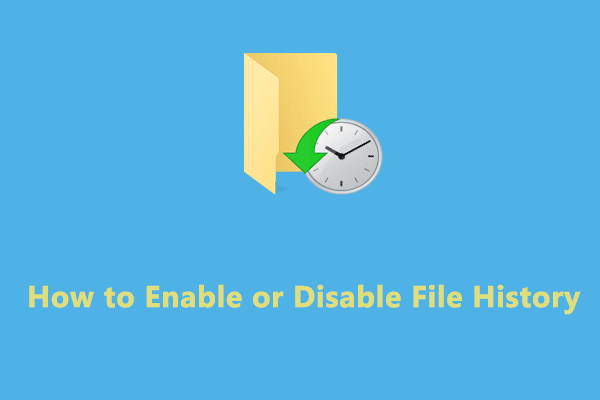
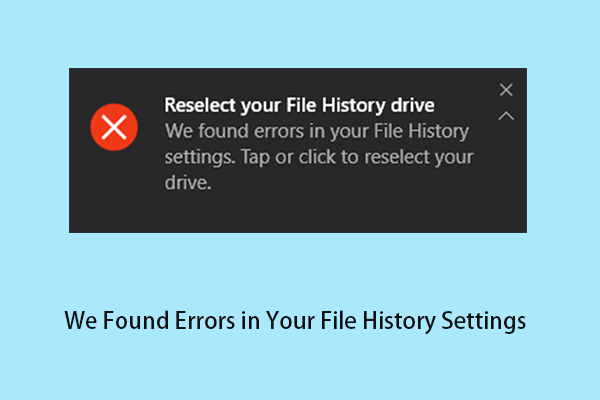

User Comments :